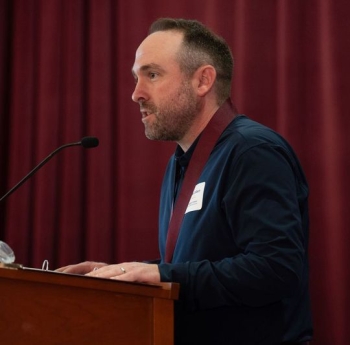US Immigration and Citizenship Lab provides online students with experience, mentorship in research, advocacy

The U.S. Immigration and Citizenship Lab provides experiential and research opportunities for online students at Arizona State University. Image courtesy Pixabay
Growing up in Arizona, ASU Online student Jaime Harrigan felt she probably knew as much about immigration as anyone who watches the nightly news.
However, delving into research on a topic that she previously only had a casual understanding of has been eye-opening.
While lots of students choose online learning for a variety of reasons, what online students struggle to find are hands-on research opportunities typically available to on-campus learners.
Harrigan is one of many online students who has taken advantage of the experiential and research opportunities offered at Arizona State University.
When the online Master of Arts in social justice and human rights launched in 2020, Allan Colbern, an assistant professor at ASU’s School of Social and Behavioral Sciences and co-director of the program, immediately recognized a gap in mentorship and training for online students compared to on-campus learners in the same program.
He began brainstorming solutions, which led to what would eventually become the U.S. Immigration and Citizenship Lab.
“The lab creates space and opportunities for online and ground students to plug into my existing research and advocacy,” Colbern said. “I also benefit from their expertise, lived experiences and the community we are building together.”
The lab provides opportunities for online and on-campus learners to get hands-on experience conducting research and using software and tools that wouldn’t normally be available to them.
Shawn Walker, a lab-affiliated faculty member in the School of Social and Behavioral Sciences, shared Colbern’s vision, and together they created a robust, interdisciplinary research agenda for the lab, combining data science and social science approaches and methods.
Students within the lab study media framing, policy developments and movement organizations. This has opened doors for lab students to learn multiple research methods, gain mentorship and co-author rigorous work with Colbern and Walker.
“Now when I hear these things being talked about, I know more about what’s going on,” Harrigan said. “In a lot of ways, that’s going to open doors to me professionally because, when I leave this program and look to get a career, I’ll know a lot about a space that I might never have looked into otherwise.”
Katelynn Pantle, originally from Seattle, jumped to work at the research lab while based in Mexico, where she has been living for over a decade.
“I’ve done everything from Mexico,” she said. “That’s why the lab was a really cool opportunity.”
Pantle, a 2023–24 fellow and project coordinator for the lab, explained that a lot of sociological research is typically done through qualitative analysis. In contrast, the lab offers the opportunity to conduct quantitative analysis.
“What I’ve learned is that this is not typical and that’s what adds to this whole program,” Pantle said. “It’s very interdisciplinary. It’s a lot of computer analysis and it’s very technical. That’s probably one of the biggest benefits of the program.”
Harrigan, also earning her Master of Arts in social justice and human rights online, agrees that her experience working in the lab with advanced research tools has helped her learn skills that will stand out to future employers.
“I think I was already a good researcher, but I’ve become a much better researcher,” Harrigan said. “Dr. Colbern specifically shared a lot of tools with us that I didn’t know before. There are tools for managing your citations, and the software we use to code and frame for language. I can actually create original research based on a dataset that I mined myself, which I think is pretty cool.”
Since its inception, the lab has provided several opportunities for students to attend conventions in Los Angeles, Berkeley and San Diego, interact with nonprofits and contribute to a growing body of research.
As part of the lab, Pantle is the project coordinator for The Border Framing Project.
“About five or six projects are going on at the same time, and within that, there are spin-offs from each student pursuing their own interests within these ideas, but the core idea is to investigate problems at the border,” Pantle said.
Framing the U.S.–Mexico Border involves looking at the dichotomy between humanitarianism efforts and enforcement efforts at the border.
Lab participants do this primarily through the lens of the media by analyzing the verbiage employed in headlines and articles. They also interview the organizations directly involved at the border, whether providing legal services, aid or other relief.
“We’re investigating these relationships, how they influence funding, how they influence people’s attitudes towards those issues,” Pantle said. “This will ultimately form into articles and reports.”
So far the project has consolidated tens of thousands of articles.
Harrigan is currently heavily involved in a report being pulled together by Colbern on the history of immigration, detention and asylum in the East Bay of San Francisco, specifically looking at the impact of having representation, or not, during expedited deportation processes.
She traded out a course on asylum and immigration specifically so that she could participate in the lab, which allowed her to receive equivalent course credit.
“I would have learned the same things, but the format would have been more passive,” Harrigan said. “I would have been given the articles to read and then I would have been given a topic to write about, whereas here I’ve done the research, I’ve found my own articles, so I’m a lot more invested in what I’m doing.”
Harrigan also found the opportunity to explore a passion project within the lab.
Coming from an Indigenous women’s issues background, rather than an immigration, asylum and citizenship background, the lab was the ideal environment to pursue her interests.
“If there’s a project we want to do on our own, we have the leniency to do that,” Harrigan said. “I've been working on a project looking at borders within and without the U.S. because of my background with Indigenous issues. I'm looking at, for example, the Tohono O’odham Nation in southern Arizona, which is on both sides of the border, and those people have experienced the border in different ways.”
The lab also applied for and won an ASU Changemaker Grant, which funds projects headed by graduate students or student organizations that have an idea to impact their community.
Pantle explained that the $2,500 Changemaker Grant will allow the lab to travel to the border and render humanitarian aid to asylum seekers as soon as spring 2024.
“We’re going to be using that money purely for resources,” Pantle said. “Like hygiene items, diapers, clothing, everything they really need.”
The grant also creates the opportunity to partner with leading organizations at the border to better understand impacted border communities. Any information gained can also be applied to the broader research within the lab.
Many of the lab’s projects are in the beginning stages, focusing on data collection, but the next steps look promising.
“We’re beginning to code the data, and in the next months, we’ll start making findings based on that data and putting together reports and hopefully create articles that we can publish,” Harrigan said.
In fact, Harrigan along with two other students are co-authors of a forthcoming 2024 publication that examines 100,521 news articles containing the word “crisis” and how it is used to frame immigration, the border, immigrants, migrants, refugees and asylum.
The lab’s first cohort, students who are now alumni, co-authored a publication in 2023 that examined 40,469 news articles to look at how the media frames the intersection between education and immigration.
For Pantle, the benefit of the program transcends publication.
“It’s hard to see purpose in life if you’re not helping people,” Pantle said. “And it’s hard to help people if you don’t understand social issues or sociohistorical context. Before this program, I would have considered myself an activist or an advocate for human rights and social issues, but this program is a really amazing opportunity to grow. It’s a really big personal development journey if you haven’t already had that during your undergrad. For me, it's been very fulfilling.”
More Local, national and global affairs

Video series tells story of 'Resettled People'
What better way for the story of former refugees to be told than having the refugees tell those stories themselves.That’s the idea behind "STEM Dreams in Motion: Stories of Resettled People."Using…

Department of State and ASU host Government Leaders Forum to strengthen semiconductor supply chains
By Emilia FrancoAs the global demand for semiconductors accelerates — with projections reaching $1 trillion by 2030 — Arizona State University, in partnership with the U.S. Department of State,…

Environmental writer, ER doctor address violence, climate change, more at sold-out ASU event
“The difficulty of understanding the consequences of heat is amplified by conventional notions of what it means to be hot. In pop culture, hot is sexy, hot is cool, hot is new…” That excerpt was…
